八年级英语M1同步及现在进行时、过去进行时讲与练
- 格式:doc
- 大小:321.58 KB
- 文档页数:12

过去进行时在线辅导讲解与练习(含答案)过去进行时是表示过去某一时刻或某一时间内正在进行或发生的动作。
可以从两个方面来理解:1 过去某一时刻正在进行或发生的动作。
E.g. They were playing football at ten o'clock yesterday morning. My mother was cooking when I got home. I was washing my clothes at this time yesterday.2 过去某阶段持续进行的动作 What were you doing during the holiday? 另外,在复合句中,若主要动作和背景动作是同时发生的,那么主从句都可用过去进行时e.g. Jenny was reading while Danny was writing.其结构是助动词be的过去形式was/were +v-ing.其句式变化仍然要在be上做文章。
E.g. We were working in class.We weren't working in class. Were you working in class?过去进行时常与过去某一特定时间的状语连用,如 last night, at that time, at noon yesterday, last Sunday 等。
也有时没有时间状语,要通过上下文的暗示来确定用过去进行时。
E.g. The students all worked hard. Everyone knew what he was working for.做题时常见错误如下:一、易把be+现在分词记成be+过去分词例:He was talked (talk) to his mum at that time.答案:was talking解析:过去进行时与现在进行时结构上的区别体现在be动词上。
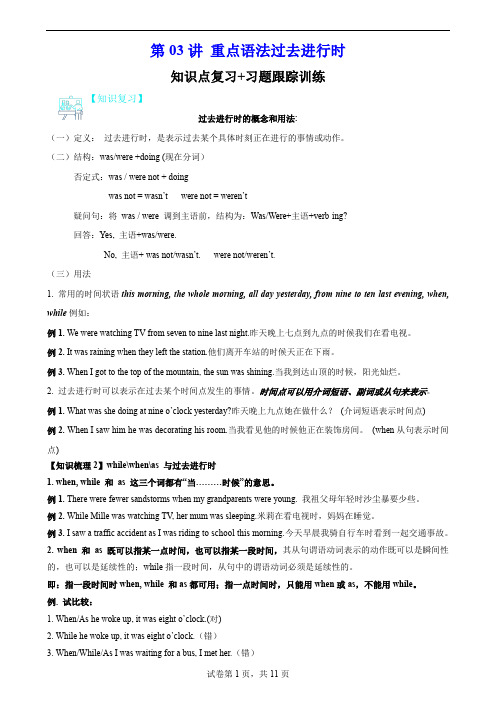
第03讲重点语法过去进行时知识点复习+习题跟踪训练【知识复习】过去进行时的概念和用法:(一)定义:过去进行时,是表示过去某个具体时刻正在进行的事情或动作。
(二)结构:was/were +doing (现在分词)否定式:was / were not + doingwas not = wasn’t were not = weren’t疑问句:将was / were 调到主语前,结构为:Was/Were+主语+verb-ing?回答:Yes, 主语+was/were.No, 主语+ was not/wasn’t. were not/weren’t.(三)用法1. 常用的时间状语this morning, the whole morning, all day yesterday, from nine to ten last evening, when, while例如:例1. We were watching TV from seven to nine last night.昨天晚上七点到九点的时候我们在看电视。
例2. It was raining when they left the station.他们离开车站的时候天正在下雨。
例3. When I got to the top of the mountain, the sun was shining.当我到达山顶的时候,阳光灿烂。
2. 过去进行时可以表示在过去某个时间点发生的事情。
时间点可以用介词短语、副词或从句来表示。
例1. What was she doing at nine o’clock yesterday?昨天晚上九点她在做什么?(介词短语表示时间点)例2. When I saw him he was decorating his room.当我看见他的时候他正在装饰房间。
(when从句表示时间点)【知识梳理2】while\when\as 与过去进行时1. when, while 和as 这三个词都有“当………时候”的意思。

人教版八年级英语下册过去进行时●语法讲解1.构成:was/were+doing2.用法:过去进行时主要表示过去某一时间或某一段时间正在进行的动作。
如:His father fell and hurt himself while he was riding his bicycle.他爸爸骑自行车时摔了下来,受伤了。
3.常用时间状语:this morning, the whole morning, all day, yesterday, from nine to ten, last morning, when, while等。
4.when与while的区别(1)引导时间状语从句时,while连接的是时间段,而when连接的多是时间点。
如:What was your father doing while your mother was cooking?你妈妈做饭时,你爸爸在干什么呢?What was your mother doing when you came back?当你回来时,你妈妈在干什么呢?(2)while 可以连接两个并列的句子,而when不可以。
如:I was trying my best to finish my homework while my sister was watching TV.我当时正在尽力完成作业,而我妹妹正在看电视。
(3)when是特殊疑问词,可以对时间进行提问,而while不能。
如:When were you born?你什么时候出生的?过去进行时练习一、用动词的适当形式填空。
1.I ___________ (have) my breakfast at half past six yesterday morning.2.Mary _____________ (go) over her lessons from six to seven last night. John and Peter_____________(do) the same thing.3.What _____ you _______ (do) at that time? W e __________ (watch) TV.4.Was your father at home yesterday evening? Yes,he was. He _______ (listen) to the radio.5.They _____(not make) a model ship when I saw him.6.______ it _________(rain) when you left school? Yes, it ____. (No, it ____)7.What _____ your father _____ (do) when he was your age?8.One day, Edison __________ (wait) for a train to arrive, and suddenly a little boy ran to thetrack(轨道) to play.9.The three of them were in a hurry because their plane __________ (leave) in five minutes.10.She __________ (make) her dress the whole afternoon.11.While we _____________ (wait) for the bus, a girl __________ (run) up to us.12.I _____________ (telephone) a friend when Bob __________ (come) in.13.Jim __________ (jump) on the bus as it __________ (move) away.14.We __________ (test) the new machine when the electricity __________ (go) off.15.She __________ (not want) to stay in bed while the others ________________ (all, work)in the fields.二、选择题1. I ______ a meal when you _____ me.A. cooked, were ringingB. was cooking, rangC. was cooking, were ringingD. cooked, rang2. He said he _____ to draw a plane on the blackboard at that time.A. triesB. triedC. was tryingD. will try3. While she ______ TV, she ______ a sound outside the room.A. was watching, was hearingB. watched, was hearingC. watched, heardD. was watching, heard4. They _____ a football game from 7 to 9 last night.A. were watchingB. watchC. watchedD. are watching5. What book ____ you ______ when I ____ you at four yesterday afternoon?A. did, read, was seeingB. did, read, sawC. were, reading, sawD. were, reading, was seeing6. It was Friday evening. Mr and Mrs. Green _____ ready to fly to England.A. are gettingB. getC. were gettingD. got7. Lei Feng _____ always _____ of others when he ______ in the army.A. is, thinking, wasB. was, thinking, isC. did, think, isD. was, thinking, was8. A girl ______ my pen fall off the table when she _____ me.A. saw, passedB. was seeing, passedC. was seeing, pastD. was seeing, was passing9. We ____ for Tom at ten last Sunday. He often kept us ______.A. were waiting, waitingB. were waiting, waitC. waited, waitingD. waited, wait10. He ____ his father on the farm the whole afternoon last Saturday.A. helpsB. would helpC. was helpingD. is helping11. While mother _______ some washing, I _____ a kite for Kate.A. did, madeB. was doing, madeC. was doing, was makingD. did, was makingThey ______ too much noise.”12. “_______ you angry then?”“A. Are, were makingB. Were, were makingC. Are, madeD. Were, made13. He ____ some cooking at that time, so he _____ me.A. did, heardB. did, didn’t hearC. was doing, heardD. was doing, didn’t hear14. This time yesterday Jack _____ his bike. He _____ TVA. repaired, didn’t watchB. was repairing, watchedwatchingC. repaired, watchedD. was repairing, wasn’t15. His parents wanted to know how he _____ on with his new classmates.A. was gettingB. getsC. is gettingD. will get过去时中考真题Part 11. —What were you doing this time yesterday?—I ____ on the grass and drawing a picture.A. sitB. satC. am sittingD. was sitting2. While I ___________ TV, the bell rang.A. watchB. watchedC. am watchingD. was watching3. —Why didn’t you answer my telephone yesterday?—Sorry. I _______ a bath.A. tookB. takeC. am takingD. was taking4. While the alien _______ a souvenir, the girl called the police.A. was buyingB. boughtC. buysD. is buying5. —I called you at 6 o'clock yesterday evening, but nobody answered.— I'm sorry. I my friend download the movie Kung Fu Panda Ⅱwhen the telephone rang,A. would helpB. helpedC. was helping6. I along the road when I saw Peter. So we stopped and had a chat.A. walkedB. was walkingC. would walkD. had walked7. —What did the teacher say just now?—Sorry. I didn’t catch it. I ____ something else.A. thinkB. will thinkC. was thinkingD. had thought8. When I came back yesterday evening, my brother ________ his homework.A is doing B. has done C. was doing9.Mrs White _____dinner when her son came home.A. is cookingB. was cookingC. are cookingD. were cooking10. —Did you see Mr. Black just now?—Yes. He ______ his car when I met him.A. parkedB. was parkingC. parksD. will park11. — Amy, I called you yesterday evening, but nobody answered the phone.— Oh, I _________ a walk with my mother at that time.A. takeB. tookC. am takingD. was taking12.Yesterday evening, I ___along the street when I suddenly met my maths teacher.A. walkB. walkedC. was walkingD. am walking13.— Where were you at 7:00 last night?— I _____ to my mom at home.A. writeB. was writingC. wrote14. —Why didn’t you go to play football with us yesterday afternoon?—I _____my mother with the housework then.A. helpedB. was helpingC. had helpedD. have been helping15. He ____when the UFO arrived. He didn’t wake until the UFO disappeared.A. sleptB. was sleepingC. was doing homeworkD. was singing16. I_______ my homework at nine o'clock last Sunday morning.A. am doingB. was doingC. do17. I was very angry with John—he just_______ when I spoke to him.A. isn’t listeningB. hasn’t listenedC. didn’t listenD. wasn’t listening18. —I called you at 4:00 yesterday afternoon, but no one answered.—Sorry, I _____ with my friends at that time.A. swimB. swamC. will swimD. was swimming19. Mr. Li _____ us a report on our environment when the earthquake happened in Japan.A. gaveB.is givingC.was giving20. — Mr. Lee ______ to a student when I entered the classroom this morning.- He is very patient ______ he is young.A. talking; butB. talks; thoughC. was talking, thoughD. talked, however21.—Were you at school when he came to see you?—Yes, I ______ a math class.A. hadB. was havingC. am havingD. have22. I met a good friend of mine while I on the street.A. walksB. walkC. was walkingD. am walking23. I ________ when the UFO landed.A. am watching TVB. was watching TVC. have watched TVD. watched TV24. The girl with two cats in the yard when the earthquake happened.A. was playingB. is playingC. are playingD. were playingPart 21. Paul and I ____ tennis yesterday. He did much better than 1.A. playB. will playC. playedD. are playing2. A big party was held in NO.18 Middle School last night, the teacher with students _____ singing and dancing happily at the party.A. isB. wasC. areD. were3. Mr. Black is going to marry a girl he _______ in Japan last year.A. meetsB. metC. has metD. would meet4. He went into his room, the light and began to work.A. has turned onB. turned offC. turned onD. has turned off5.—What did Mr. Smith do before he came to China?—He in a car factory.A. worked B.works C.is working D.will work6. —Have you ever been to Hong Kong?—Yes, I ___there last month.A. went toB. have beenC. went7. This morning I had hardly got to my school when it_____ to rain.A. had begunB. was beginningC. beganD. begins8.—You have found your lost umbrella, haven’t you?—Yes. I _____ it behind the door this afternoon.A. have foundB. will findC. found9. Tom, along with three other boys, _______ seen playing football a moment ago.A. isB. wasC. areD. were10. Ten minutes ago, there______ an eraser, a pen and some books on the desk.A. wasB. wereC. is11. — How was your trip to Hang Zhou, Jim?—Great! We ___ to Xixi National Wetland Park.A. goB. am goingC. will goD. went12. – Do you know who cleaned the blackboard, Tina?-- Yes. John _____.A. doB. doesC. did13. The last time I ______ to the cinema was two years ago.A. goB. have goneC. have beenD. went14. — Have you ever been to Canada?— Yes, I there last year with my parents.A. have beenB. have goneC. wentD. go15. I called you, but nobody answered. Where _______ you?A. isB. areC. wasD. were16. ---Have you ever been to Shanghai?---Yes. I _____ there a few months ago.A have been B. went C. have gone17. What’s the best present you have ever ________?A. receivedB. receivesC. receiving18.—Lin Kai, hand in your homework, please.—Oh, sorry. I ______ it at home this morning.A. was leavingB. has leftC. will leaveD. left19. I'm now in New York with my friend Jenny. We_____ by plane on Monday.A.arriveB. arrivedC. are arrivingD. will arrive20.—Guess What! The great movie is on in the cinema.一Nothing new.I_________ it with my parents on the first day.A. saw B.see C.will see D. have been21. If it had been fine yesterday, we could have watched that air show. But it ____ all day.A. has rainedB. had rainedC. rainedD. rains22. –When _______ your mother _______ you that blue dress, Lucy?Maybe two or three weeks ago.–Sorry, I really can’t remember.A. will; buyB. does; buyC. did; buy23. -I’ve got a ticket for the basketball game tonight.-Cool!How you it?A. had, gotB. did, getC. were, gettingD. will, get24. Hello! I'm very glad to see you. When________ you_________ here?A. did; arriveB. will; arriveC. have; arrivedD. are; arriving25. —I have to be off right now.—What a pity! I you could stay a little longer with us.A. thinkB. am thinkingC. thought26. Tom was so careless that he __ his right arm when he was riding to school.A. hurtsB. hurtC. has hurtD. had hurt27. —I ______ something wrong just now. May 1 use your eraser?—Of course. Here you are.A. writeB. wroteC. am writing过去进行时练习一、用动词的适当形式填空。

初中英语过去进行时讲解及练习(一)定义过去进行时,是表示过去某个具体时刻正在进行的事情或动作。
(二)结构was/were +doing (现在分词)(三)用法1、过去进行时表示过去某段时间内持续进行的动作或者事情。
常用的时间状语this morning, the whole morning, all day yesterday, from nine to ten last evening, when, while例如:(1)We were watching TV from seven to nine last night.昨天晚上七点到九点的时候我们在看电视。
(2)What was he researching all day last Sunday?上周日他一整天都在研究什么?(3)It was raining when they left the station.他们离开车站的时候天正在下雨。
2.过去进行时可以表示在过去某个时间点发生的事情。
时间点可以用介词短语、副词或从句来表示。
如What was she doing at nine o'clock yesterday?昨天晚上九点她在做什么?(介词短语表示时间点)When I saw him he was decorating his room.当我看见他的时候他正在装饰房间。
(when 从句表示时间点)3.在复合句中,如果主要动作和背景动作都是延续的或同时发生的,那么主从句的动词都可用过去进行时。
例如:While he was waiting for the bus, he was reading a newspaper.他边等车边看报。
(两个动作都是延续的)He was cleaning his car while I was cooking.他擦车时我在做饭。
(两个动作同时进行) 4、表示在过去即将发生的动作。
如:She asked him whether he was coming back for supper.5、表示过去的反复性或习惯性的动作,常与副词always,constantly,continually,frequently 等连用,常常带有说话人的某种感情色彩。

八年级上册英语m1的语法知识点八年级上册英语M1是新学期开始的一个重要模块,其中包含了大量的语法知识点,这些知识点是学好英语的基础,很多语法规则在后面的学习中都会反复出现。
下面我们详细介绍一下这些重要的语法知识点。
一、现在进行时
现在进行时表示现在正在进行的动作或状态,其结构为“主语+be(am, is, are)+现在分词”,例如“我们正在学习英语。
”“We are learning English.”
二、一般现在时
一般现在时表示经常性的动作或状态,其结构为“主语+动词原形+s/es”,例如“我每天都去学校。
”“I go to school every day.”
三、一般过去时
一般过去时表示过去某个时刻或一段时间内所发生的动作或状态,其结构为“主语+动词过去式”,例如“昨天我看了一部电影。
”“Yesterday I watched a movie.”
四、现在完成时
现在完成时表示过去发生的动作对现在的影响或结果,其结构为“主语+have/has+过去分词”,例如“我已经完成了作业。
”“I have fin ished my homework.”
五、一般将来时
一般将来时表示将要发生的动作或状态,其结构为“主语+will+动词原形”,例如“明天我将会去上学。
”“I will go to school tomorrow.”
六、情态动词
情态动词有can、could、may、might、must等,表示能力、请求、建议、推测等不同的意义。
它们的用法比较灵活,请注意。
以上就是八年级上册英语M1的主要语法知识点,希望同学们能够认真学习,并在后续的英语学习中逐步熟练掌握。

过去进行时讲解与习题过去进行时是表示过去某一时刻或某一时间内正在进行或发生的动作。
可以从两个方面来理解: 1 过去某一时刻正在进行或发生的动作。
They were playing football at ten o’clock yesterday morning. My mother was cooking when I got home. I was washing my clothes at this time yesterday. 2 过去某阶段持续进行的动作What were you doing during the holiday? 另外,在复合句中,若主要动作和背景动作是同时发生的,那么主从句都可用过去进行时Jenny was reading while Danny was writing.其结构是助动词be的过去形式was/were +v-ing.其句式变化仍然要在be上做文章。
We were working in class.We weren’t working in class.Were you working in class?过去进行时常与过去某一特定时间的状语连用,如last night, at that time, at noon yesterday, last Sunday 等。
也有时没有时间状语,要通过上下文的暗示来确定用过去进行时。
The students all worked hard. Everyone knew what he was working for.1.过去进行时的构成过去进行时是由“was / were +现在分词”构成的。
I was doing my homework at this time yesterday.昨天的这个时候我正在做作业。
Were you expecting him yesterday?你昨天一直在等他吗?They were not talking when I came in.我进来的时候他们没在说话。
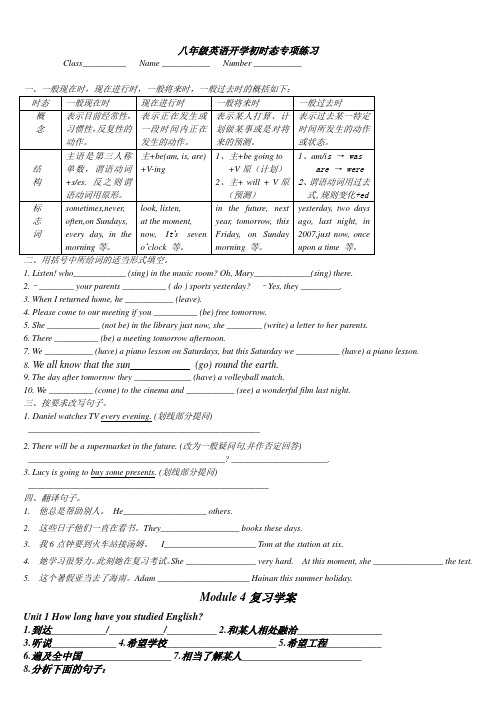
八年级英语开学初时态专项练习Class__________ Name ___________ Number ___________1. Listen! who____________ (sing) in the music room? Oh, Mary_____________(sing) there.2.–________ your parents __________ ( do ) sports yesterday? –Yes, they _________.3. When I returned home, he ___________ (leave).4. Please come to our meeting if you __________ (be) free tomorrow.5. She ____________ (not be) in the library just now, she ________ (write) a letter to her parents.6. There __________ (be) a meeting tomorrow afternoon.7. We ___________ (have) a piano lesson on Saturdays, but this Saturday we __________ (have) a piano lesson.8.We all know that the sun _______ (go) round the earth.9. The day after tomorrow they _____________ (have) a volleyball match.10. We __________ (come) to the cinema and ___________ (see) a wonderful film last night.三、按要求改写句子。
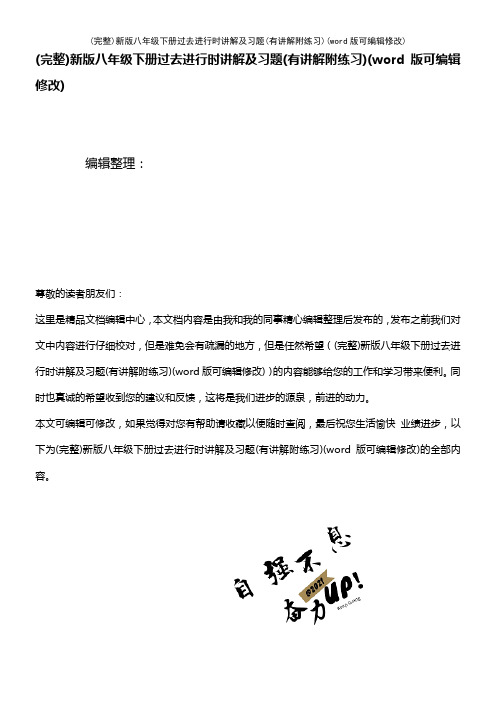
(完整)新版八年级下册过去进行时讲解及习题(有讲解附练习)(word版可编辑修改)编辑整理:尊敬的读者朋友们:这里是精品文档编辑中心,本文档内容是由我和我的同事精心编辑整理后发布的,发布之前我们对文中内容进行仔细校对,但是难免会有疏漏的地方,但是任然希望((完整)新版八年级下册过去进行时讲解及习题(有讲解附练习)(word版可编辑修改))的内容能够给您的工作和学习带来便利。
同时也真诚的希望收到您的建议和反馈,这将是我们进步的源泉,前进的动力。
本文可编辑可修改,如果觉得对您有帮助请收藏以便随时查阅,最后祝您生活愉快业绩进步,以下为(完整)新版八年级下册过去进行时讲解及习题(有讲解附练习)(word版可编辑修改)的全部内容。
过去进行时一.概念:过去进行时主要表示过去某个时刻或某一阶段正在进行的动作,常和表示过去的时间状语then,at that time/ moment, yesterday,at nine,last night 等连用或者与when, while, as引导的过去时间状语连用。
但在不少情况下,没有表示时间的状语,这时需要通过上下文来表示。
We were watching TV from seven to nine last night。
What was he researching all day last Sunday?二.过去进行时的主要用法是描述一件事发生的背景;一个长动作发生的时候,另一个短动作发生(长动作用过去进行时,短动作用一般过去时)。
也可以表示两个动作同时发生,此时均用过去进行时When I saw him he was cleaning his room。
While he was waiting for the bus, he was reading a newspaper。
He was cleaning his car while I was cooking.三.When/ While“当……的时候"的区别①when 既指时间点,也可指段时间,while只指段时间,因此when引导的时间状语从句中的动词可以是短暂性动词,也可以是延续性动词,而while从句中的动词必须是延续性动词。
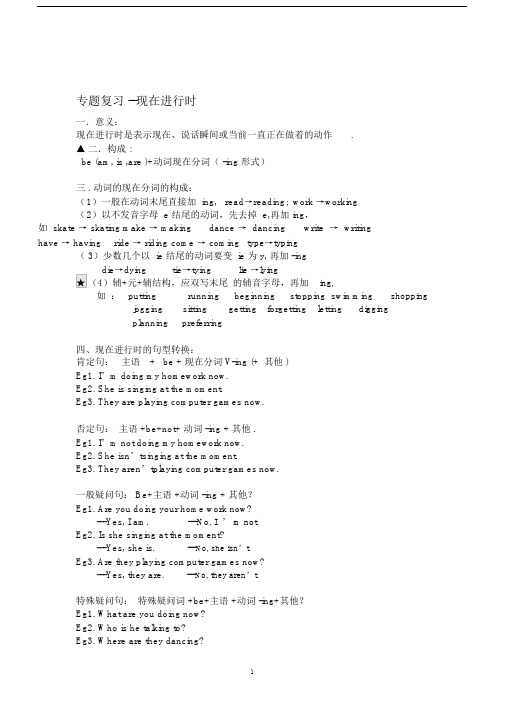
专题复习 --现在进行时一.意义:现在进行时是表示现在、说话瞬间或当前一直正在做着的动作.▲二.构成 :be (am, is ,are )+动词现在分词( -ing 形式)三 . 动词的现在分词的构成:(1)一般在动词末尾直接加 ing, read→reading; work →working(2)以不发音字母 e 结尾的动词,先去掉 e,再加 ing,如 skate → skating make → making dance → dancing write → writinghave → having ride → riding come → coming type→typing( 3)少数几个以 ie 结尾的动词要变 ie 为 y, 再加 -ingdie→dying tie→tying lie →lying★(4)辅+元+辅结构,应双写末尾的辅音字母,再加ing,如:putting running beginning stopping swimming shopping jogging sitting getting forgetting letting diggingplanning preferring四、现在进行时的句型转换:肯定句:主语+be + 现在分词 V-ing (+ 其他 )Eg1. I’m doing my homework now.Eg2. She is singing at the moment.Eg3. They are playing computer games now.否定句:主语 +be+not+ 动词 -ing + 其他 .Eg1. I’m not doing my homework now.Eg2. She isn’tsinging at the moment.Eg3. They aren’tplaying computer games now.一般疑问句: Be+主语 +动词 -ing + 其他?Eg1. Are you doing your home work now?---Yes, I am.---No, I ’ m not.Eg2. Is she singing at the moment?---Yes, she is.---No, she isn’t.Eg3. Are they playing computer games now?---Yes, they are.---No, they aren’t.特殊疑问句:特殊疑问词 +be+主语 +动词 -ing+其他?Eg1. What are you doing now?Eg2. Who is he talking to?Eg3. Where are they dancing?五、现在进行时的时间标志及用法:1)一般句中用到表示“在现在”的时间状语,如:now, right now, at the moment 或 It ’几s+点钟”句型,常判断用现在进行时。

英语中过去进行时的总结与练习题一、过去进行时的总结过去进行时是一种表示过去某个时间点或某个时间段内正在进行的动作的时态。
它常常与表示过去的时间状语连用,如“yesterday”, “last night”, “at that time”等。
过去进行时的基本结构是“was/were + 现在分词”。
1. 用途与功能•描述过去某个时刻正在进行的动作或状态。
•与过去某个时刻的短暂动作或状态进行对比。
•与一般过去时连用,表示两个过去动作同时发生。
2. 构成方式•主语为第三人称单数时,使用“was + 现在分词”。
•主语为其他形式时,使用“were + 现在分词”。
3. 与其他时态的区别•与一般过去时相比,过去进行时强调动作在过去的某个时间点或时间段内正在进行,而一般过去时则强调动作的完成或结束。
•与现在进行时相比,过去进行时描述的是过去的情景,而现在进行时描述的是现在的情景。
4. 常见的时间状语•at that time•at noon•at midnight•this morning/afternoon/evening•yesterday•last night•when, while引导的时间状语从句二、练习题选择题1.When I ______ my homework, my sister ______ TV.A. did; watchedB. was doing; was watchingC. was doing; watchedD. did; was watching2.They ______ a football match from 7 to 9 last night.A. watchedB. are watchingC. were watchingD. watch3.What ______ you ______ at 8 o’clock last night?A. did; doB. were; doingC. are; doingD. do; do4.It was raining hard. They ______ just ______ their umbrellas.A. had; leftB. have; leftC. had; been leavingD. were; leaving5.We ______ a film at 8 last night when the power cut off.A. watchedB. are watchingC. were watchingD. had watched填空题1.I ______ (cook) dinner when the phone rang.st night, they ______ (play) cards when I ______ (arrive) home.3.While the teacher ______ (explain) the text, the students ______ (take) notes.4.We ______ (have) a meeting from 2 to 4 yesterday afternoon.5.When I ______ (get) to the station, the train ______ (leave).翻译题1.昨天晚上8点,我正在做作业,而我的弟弟正在看电视。
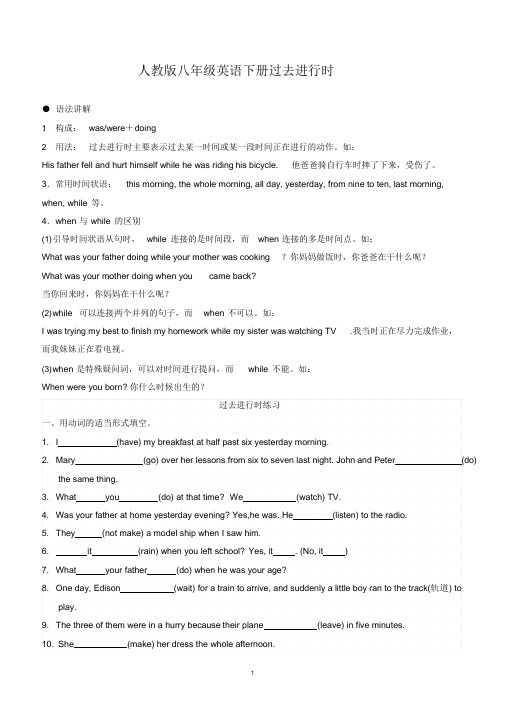
人教版八年级英语下册过去进行时●语法讲解1.构成:was/were+doing2.用法:过去进行时主要表示过去某一时间或某一段时间正在进行的动作。
如:His father fell and hurt himself while he was riding his bicycle. 他爸爸骑自行车时摔了下来,受伤了。
3.常用时间状语:this morning, the whole morning, all day, yesterday, from nine to ten, last morning, when, while 等。
4.when 与while 的区别(1) 引导时间状语从句时,while 连接的是时间段,而when 连接的多是时间点。
如:What was your father doing while your mother was cooking ?你妈妈做饭时,你爸爸在干什么呢?What was your mother doing when you came back?当你回来时,你妈妈在干什么呢?(2) w hile 可以连接两个并列的句子,而when 不可以。
如:I was trying my best to finish my homework while my sister was watching TV .我当时正在尽力完成作业,而我妹妹正在看电视。
(3) w hen 是特殊疑问词,可以对时间进行提问,而while 不能。
如:When were you born? 你什么时候出生的?过去进行时练习一、用动词的适当形式填空。
1. I (have) my breakfast at half past six yesterday morning.2. Mary (go) over her lessons from six to seven last night. John and Peter (do)the same thing.3. What you (do) at that time? We (watch) TV.4. Was your father at home yesterday evening? Yes,he was. He (listen) to the radio.5. They (not make) a model ship when I saw him.6. it (rain) when you left school? Yes, it . (No, it )7. What your father (do) when he was your age?8. One day, Edison (wait) for a train to arrive, and suddenly a little boy ran to the track(轨道) toplay.9. The three of them were in a hurry because their plane (leave) in five minutes.10. She (make) her dress the whole afternoon.11. While we (wait) for the bus, a girl (run) up to us.12. I (telephone) a friend when Bob (come) in.13. Jim (jump) on the bus as it (move) away.14. We (test) the new machine when the electricity (go) off.15. She (not want) to stay in bed while the others (all, work) in the fields.二、选择题1. I a meal when you me.A. cooked, were ringingB. was cooking, rangC. was cooking, were ringingD. cooked, rang2. He said he to draw a plane on the blackboard at that time.A. triesB. triedC. was tryingD. will try3. While she TV, she a sound outside the room.A. was watching, was hearingB. watched, was hearingC. watched, heardD. was watching, heard4. They a football game from 7 to 9 last night.A. were watchingB. watchC. watchedD. are watching5. What book you when I you at four yesterday afternoon?A. did, read, was seeingB. did, read, sawC. were, reading, sawD. were, reading, was seeing6. It was Friday evening. Mr and Mrs. Green ready to fly to England.A. are gettingB. getC. were gettingD. got7. Lei Feng always of others when he in the army.A. is, thinking, wasB. was, thinking, isC. did, think, isD. was, thinking, was8. A girl my pen fall off the table when she me.A. saw, passedB. was seeing, passedC. was seeing, pastD. was seeing, was passing9. We for Tom at ten last Sunday. He often kept us .A. were waiting, waitingB. were waiting, waitC. waited, waitingD. waited, wait10. He his father on the farm the whole afternoon last Saturday.A. helpsB. would helpC. was helpingD. is helping11. While mother some washing, I a kite for Kate.A. did, madeB. was doing, madeC. was doing, was makingD. did, was making12. “you angry then? The”y “too much noise. ”A. Are, were makingB. Were, were makingC. Are, madeD. Were, made13. He some cooking at that time, so he me.A. did, heardB. did, didn ’t hearC. was doing, heardD. was doing, didn ’t hear14. This time yesterday Jack his bike. He TVA. repaired, didn ’t watc B h. was repairing, watchedC. repaired, watchedD. was repairing, wasn watc’hin t g15. His parents wanted to know how he on with his new classmates.A. was gettingB. getsC. is gettingD. will get过去时中考真题Part 11. —What were you doing this time yesterday?—I on the grass and drawing a picture.A. sitB. satC. am sittingD. was sitting2. While I TV, the bell rang.A. watchB. watchedC. am watchingD. was watching3. —Why didn ’t you answer my telephone yesterday?—Sorry. I a bath.A. tookB. takeC. am takingD. was taking4. While the alien a souvenir, the girl called the police.A. was buyingB. boughtC. buysD. is buying5. —I called you at 6 o'clock yesterday evening, but nobody answered.— I'm sorry. I my friend download the movie Kung Fu PandaⅡwhen the telephone rang,A. would helpB. helpedC. was helping6. I along the road when I saw Peter. So we stopped and had a chat.A. walkedB. was walkingC. would walkD. had walked7. —What did the teacher say just now?— Sorry. I didn ’t catch it. I something else.A. thinkB. will thinkC. was thinkingD. had thought8. When I came back yesterday evening, my brother his homework.A is doing B. has done C. was doing9. M rs White dinner when her son came home.A. is cookingB. was cookingC. are cookingD. were cooking10. —D id you see Mr. Black just now?—Yes. He his car when I met him.A. parkedB. was parkingC. parksD. will park11. —Amy, I called you yesterday evening, but nobody answered the phone.— Oh, I a walk with my mother at that time.A. takeB. tookC. am takingD. was taking12. Y esterday evening, I along the street when I suddenly met my maths teacher.A. walkB. walkedC. was walkingD. am walking13.—Where were you at 7:00 last night?— I to my mom at home.A. writeB. was writingC. wrote14. —Why didn ’t you go to play football with us yesterday afternoon?—I my mother with the housework then.A. helpedB. was helpingC. had helpedD. have been helping15. He when the UFO arrived. He didn ’t wake until the UFO disappeared.A. sleptB. was sleepingC. was doing homeworkD. was singing16. I my homework at nine o'clock last Sunday morning.A. am doingB. was doingC. do17. I was very angry with John—he just when I spoke to him.A. isn ’t listeningB. hasn ’t listenedC. didn ’t listenD. wasn ’t listening18. —I called you at 4:00 yesterday afternoon, but no one answered.—Sorry, I with my friends at that time.A. swimB. swamC. will swimD. was swimming19. Mr. Li us a report on our environment when the earthquake happened in Japan.A. gaveB.is givingC. was giving20. —Mr. Lee to a student when I entered the classroom this morning.- He is very patient he is young.A. talking; butB. talks; thoughC. was talking, thoughD. talked, however21.—Were you at school when he came to see you?—Yes, I a math class.A. hadB. was havingC. am havingD. have22. I met a good friend of mine while I on the street.A. walksB. walkC. was walkingD. am walking23. I when the UFO landed.A. am watching TVB. was watching TVC. have watched TVD. watched TV24. The girl with two cats in the yard when the earthquake happened.A. was playingB. is playingC. are playingD. were playingPart 21. Paul and I tennis yesterday. He did much better than 1.A. playB. will playC. playedD. are playing2. A big party was held in NO.18 Middle School last night, the teacher with students singing and dancing happily at the party.A. isB. wasC. areD. were3. Mr. Black is going to marry a girl he in Japan last year.A. meetsB. metC. has metD. would meet4. He went into his room, the light and began to work.A. has turned onB. turned offC. turned onD. has turned off5.—W hat did Mr. Smith do before he came to China?—He in a car factory.A. worked B.works C.is working D.will work6. —Have you ever been to Hong Kong?—Yes, I ___there last month.A. went toB. have beenC. went7. This morning I had hardly got to my school when it to rain.A. had begunB. was beginningC. beganD. begins8.—Y ou have found your lost umbrella, haven ’t you?—Yes. I it behind the door this afternoon.A. have foundB. will findC. found9. Tom, along with three other boys, seen playing football a moment ago.A. isB. wasC. areD. were10. Ten minutes ago, there an eraser, a pen and some books on the desk.A. wasB. wereC. is11. —How was your trip to Hang Zhou, Jim?—Great! We to Xixi National Wetland Park.A. goB. am goingC. will goD. went12. –Do you know who cleaned the blackboard, Tina?-- Yes. John .A. doB. doesC. did13. The last time I to the cinema was two years ago.A. goB. have goneC. have beenD. went14. —Have you ever been to Canada?— Yes, I there last year with my parents.A. have beenB. have goneC. wentD. go15. I called you, but nobody answered. Where you?A. isB. areC. wasD. were16. ---Have you ever been to Shanghai?---Yes. I there a few months ago.A have been B. went C. have gone17. What’s the best present you have ever ?A. receivedB. receivesC. receiving18.—Lin Kai, hand in your homework, please.—Oh, sorry. I it at home this morning.A. was leavingB. has leftC. will leaveD. left19. I'm now in New York with my friend Jenny. We by plane on Monday.A. arriveB. arrivedC. are arrivingD. will arrive20.—Guess What! The great movie is on in the cinem.a一Nothing n ew.I it with my parents on the first day.A. saw B.see C.will see D. have been21. If it had been fine yesterday, we could have watched that air show. But it all day.A. has rainedB. had rainedC. rainedD. rains22. –When your mother you that blue dress, Lucy?–Sorry, I really can ’t rem M e a m ybert.wo or three weeks ago.A. will; buyB. does; buyC. did; buy23. -I ’v e got a ticket for the basketball game tonight.-Cool!How you it?A. had, gotB. did, getC. were, gettingD. will, get24. Hello! I'm very glad to see you. When you here?A. did; arriveB. will; arriveC. have; arrivedD. are; arriving25. —I have to be off right now.—What a pity! I you could stay a little longer with us.A. thinkB. am thinkingC. thought26. Tom was so careless that he his right arm when he was riding to school.A. hurtsB. hurtC. has hurtD. had hurt27. —I something wrong just now. May 1 use your eraser?—Of course. Here you are.A. writeB. wroteC. am writing过去进行时练习一、用动词的适当形式填空。

现在进行时一、意义——当表示现在正在进行的动作或正在发生的事。
时间标志—— now,句前的 look ,listen二、构成 :be (am, is ,are )+动词现在分词-ing形式必然句:主语+ be +现在分词V-ing (+其他)I ’m doing my homework now .否定句:主语 +be+not+动词 -ing + 其他 .I ’m not doing my homework now.一般疑问句: Be+主语 +动词 -ing + 其他 ?Are you doing your home work now?Yes, I am . No , I’m not .特别疑问句:特别疑问词+be+主语 +动词 -ing+ 其他 ?What are you doing now ?种类构成例句主语I am singing.必然句+be(am/are/is)+doing+...我正在唱歌。
主语 +be(am/are/is)+not’否定句They aren t playing games.+doing+...他们没有在玩游戏。
Be(Am/Are/Is)+主语Are you having lunch?一般疑问句+doing+?你正在吃午饭嘛?疑问词 +be(am/are/is)+主Why are you doing?特别疑问句语+doing+....?你为什么哭?三、现在分词的构成:(1)一般在动词尾端直接加 ing,(2)以不发音字母 e 结尾的动词,先去掉 e, 再加 ing ,如m ake →making dance → dancing跳舞write→writing 写 have → having ride→ riding骑come→ coming来(3)以重读闭音节结尾的动词,中间只有一个元音字母,词尾只有一个辅音字母,应双写尾端的辅音字母,再加ing,如:putting running beginning stopping swimming shopping jogging sitting getting forgetting letting情况构词方法例词一般情况加-ing study→ studying ask→asking work→working see→ seeing dance→dancing take→taking以不发音的 e 结尾去 e 加 -ing→move movingbecome→becomingswim→swimming以重读闭音节结尾端,末末位字母双写再加run→running尾只有一个辅音字母-ing beg→ beggingforget →forgetting 以 y 结尾的动词直接加 -ingstudy→ studyingplay→playing少许几个以 ie 结尾的动先把 ie 变为 y 再加lie→lying词-ing四、现在进行时的基本用法:(1)表示现在 ( 指说话人说话时 ) 正在发生的事情。

八年级英语M1同步及现在进行时、过去进行时讲与练教学目的1、掌握be 动词的三种形式、相对应的过去形式及其用法;2、掌握现在进行时的定义、用法、结构、现在分词的变化规则;3、掌握过去进行时的定义、用法、结构、现在分词的变化规则;重点难点1、现在进行时与过去进行时的区别;2、现在分词的变化规则;3、重点单词句型;教学内容2. We________ (listen) to the music while they________ (dance) .3.What ____you ____(do) while I____ (make) a model plane.4. While my mother ______ (watch) TV, I ______(make) a kite.1、I was very angry with John—he just_______ when I spoke to him.【2013江苏徐州】A. isn’t listeningB. hasn’t listenedC. didn’t listenD. wasn’t listening2、—I called you at 4:00 yesterday afternoon, but no one answered.—Sorry, I _____ with my friends at that time.【2013•河南省】A. swimB. swamC. will swimD. was swimming3、Mr. Li _____ us a report on our environment when the earthquake happened in Japan.【2011湖南湘潭】A. gaveB.is givingC.was giving4、— Mr. Lee _ to a student when I entered the classroom this morning.- He is very patient _ _he is young.【2011广东深圳】A. talking; butB. talks; thoughC. was talking, thoughD. talked, however5、—Were you at school when he came to see you?—Yes, I ______ a math class.【2011辽宁本溪】A. hadB. was havingC. am havingD. have归纳总结本节课,你的收获是什么呢?Homework:1. 熟记本次课所讲的语法点,完成讲义上课后作业;2. 将课上所做的错题整理到错题本上;3. 下次课前做好复习,上课听写。
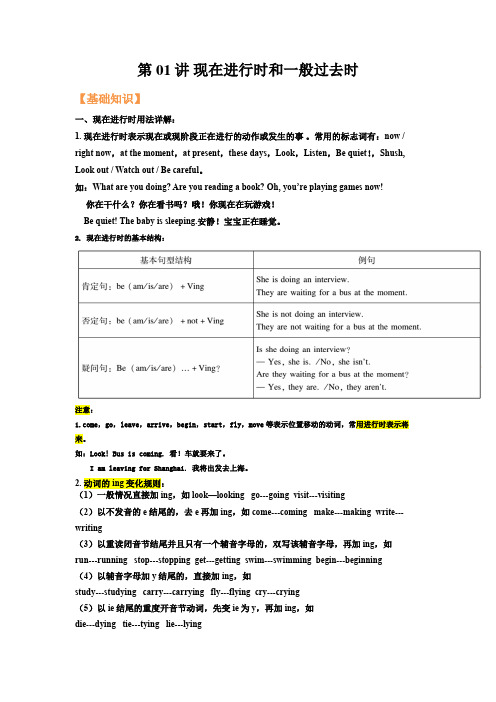
第01讲现在进行时和一般过去时【基础知识】一、现在进行时用法详解:1. 现在进行时表示现在或现阶段正在进行的动作或发生的事。
常用的标志词有:now / right now,at the moment,at present,these days,Look,Listen,Be quiet!,Shush, Look out / Watch out / Be careful。
如:What are you doing? Are you reading a book? Oh, you’re playing games now!你在干什么?你在看书吗?哦!你现在在玩游戏!Be quiet! The baby is sleeping.安静!宝宝正在睡觉。
2. 现在进行时的基本结构:注意:e,go,leave,arrive,begin,start,fly,move等表示位置移动的动词,常用进行时表示将来。
如:Look! Bus is coming. 看!车就要来了。
I am leaving for Shanghai. 我将出发去上海。
2. 动词的ing变化规则:(1)一般情况直接加ing,如 look—looking go---going visit---visiting(2)以不发音的e结尾的,去e再加ing,如 come---coming make---making write---writing(3)以重读闭音节结尾并且只有一个辅音字母的,双写该辅音字母,再加ing,如run---running stop---stopping get---getting swim---swimming begin---beginning(4)以辅音字母加y结尾的,直接加ing,如study---studying carry---carrying fly---flying cry---crying(5)以ie结尾的重度开音节动词,先变ie为y,再加ing,如die---dying tie---tying lie---lying二、一般过去时用法详解:时态含义结构时间状语一般过去时表示过去发生的动作或存在的状态,也可表示过去经常性的动作。
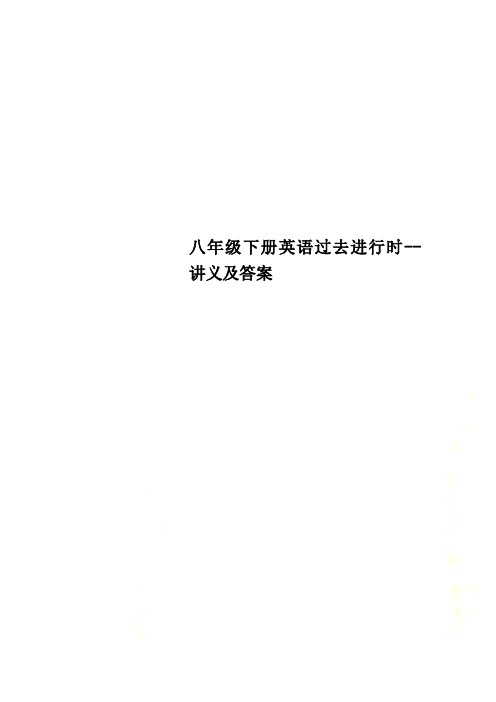
八年级下册英语过去进行时--讲义及答案过去进行时(讲义)【知识点睛】一、过去进行时基本结构及句型句式转换二、过去进行时用法:1.过去某一时刻正在进行2.过去某一段时间正在进行3.过去进行表示过去将来三、when 和while 的异同1.相同点:当时间状语从句为过去进行时时,二者通用.2.不同点:1)当主句在前,表示事情发生的背景氛围时,when 表示突然;2)while 表示一段时间,动词多为可持续性的.四、学海拾贝五、综合训练附:常见的延续性动词和终止性(非延续性或瞬间性)动词延续性动词终止性(非延续性或瞬间性)动词延续性动词表示的动作不但可以延续,而且可以产生持久的影响。
它表示的动作不能延续,也就是说动作一旦发生就立即结束,并产生某种结果。
be,have,keep,know,learn,lie ,live,read,sing,sleep,stand,stay ,wait,walk,watch 等.accept,arrive,become,begin,borrow,break,buy ,catch,close,come,die,end,fall,finish,get,give ,go,join,leave,put,reach,receive,shut,start ,stop 等.【学海拾贝】Lesson 7 Too LateThe plane was late and detectives /di'tektiv/ were waiting at the airport all morning.They were expecting /ik'spekt/ a valuable/'væljuəbl/ parcel /'pɑ:sl/ of diamonds /'daiəmənd/ from South Africa.A fe w hour s earlier,s omeone had told the police that thieve s第 1 页第 2 页第 3 页( )6. My father a newspaper at 7:00 yesterday morning .A.is reading B.was readingC.were reading D.read( )7. They a football game from 8 to 10 last night.A.were watching B.watchC.watched D.are watching( )8. My father and I the house all morning.A.has cleaned B.had cleanedC.were cleaning D.cleaned9.昨天一整天约翰都在为考试学习。
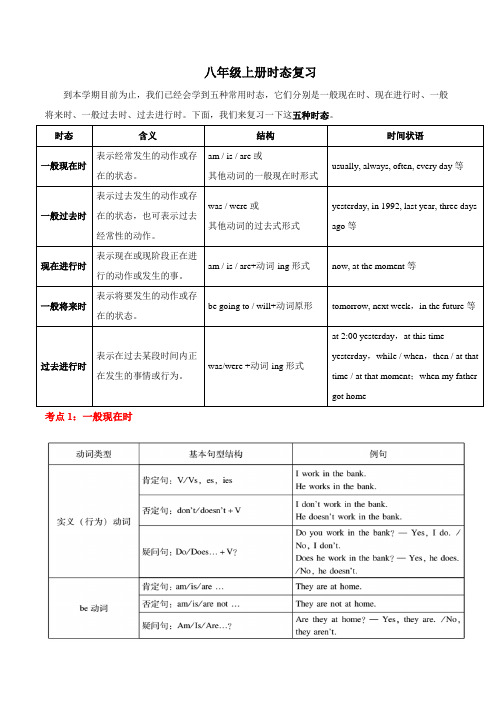
八年级上册时态复习到本学期目前为止,我们已经会学到五种常用时态,它们分别是一般现在时、现在进行时、一般将来时、一般过去时、过去进行时。
下面,我们来复习一下这五种时态。
考点1:一般现在时构成一般现在时主要用动词原形表示,如果主语是第三人称单数,一般在动词原形后加-s或-es。
如:Tom often at home.汤姆在家经常帮助父母做家务。
Sometimes Lucy herself.有时候露西自己洗衣服。
2.与一般现在时连用的时间状语(1)表示频率的副词always,often,usually,sometimes等。
(2)on Sundays,on Monday afternoons,every day,every morning,every year等时间状语。
(3)once a year,twice a month,three times a week 等表示频率的词组。
3.一般现在时的用法(1)表示经常性或习惯性的动作或存在的状态。
与often,always,usually,sometimes,once a week,every day等表示频率的副词或时间状语连用。
如:I often go to school by bike.我经常骑自行车去上学。
(2)表示客观事实或普遍真理。
如:The earth the sun.地球绕着太阳转。
(3)在时间、条件等状语从句中,用一般现在时代替一般将来时。
常用的标志词有:if,unless,as soon as,when,not … until …,before。
如:If it rains tomorrow,we won’t go to the park.如果明天下雨,我们就不去公园了。
You’ll be late for school if you don’t take a taxi.如果不搭计程车,你上学就迟到了When I ,I will go to America.我长大后将去美国。
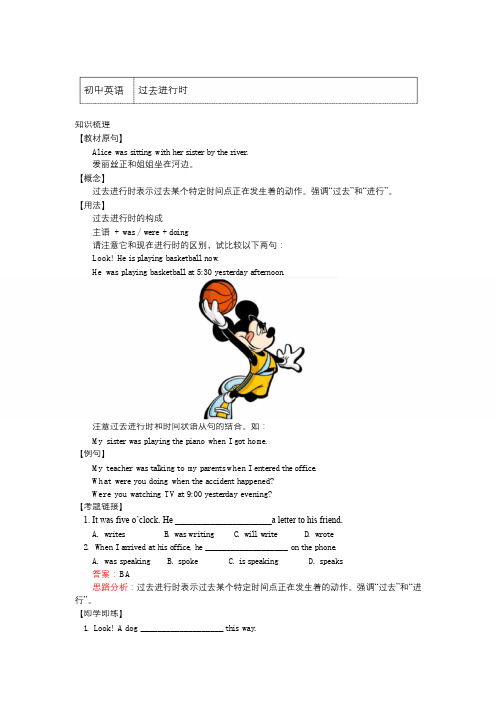
初中英语过去进行时知识梳理【教材原句】Alice was s i t t ing wi th he r s i s t e r by the r ive r.爱丽丝正和姐姐坐在河边。
【概念】过去进行时表示过去某个特定时间点正在发生着的动作。
强调“过去”和“进行”。
【用法】过去进行时的构成主语+ was/ were + do ing请注意它和现在进行时的区别,试比较以下两句:Look! He i s p lay ing baske tba l l now.He was p lay ing baske tba l l a t 5:30 yest e rday a f te rnoon.注意过去进行时和时间状语从句的结合。
如:M y s i s te r was p laying the p iano when I go t home.【例句】M y teacher was t a l king to my paren t s when I en te red the of f ice.W hat were you do i ng when the acc ident happened?W ere you watch ing TV a t 9:00 yes te r day even ing?【考题链接】1. It was five o’clock. He ______________________a letter to his friend.A. wr i tesB. was wri t ingC. wi l l wr i t eD. wrote2.When I a r r ived at h i s o f f i ce, he ___________________ on the phone.A. was speak ingB.spokeC.i s speak ingD.speaks答案:B A思路分析:过去进行时表示过去某个特定时间点正在发生着的动作。

一般过去式讲解与练习(讲解篇)一、概念:一、定义:过去进行时表示过去某一时刻或者某段时间正在进行或发生的动作,常和表过去的时间状语连用,可以从两个方面来理解:1 过去某一时刻正在进行或发生的动作。
I was doing my homework at this time yesterday.昨天的这个时候我正在做作业。
2 过去某阶段持续进行的动作They were waiting for you yesterday.他们昨天一直在等你。
二、结构1.肯定结构:主语+ was/were +doing (现在分词)+其它其中第一、三人称单数及单数名词用was,第二人称以及复数名词用were2.否定结构:主语+ was/were +not +doing (现在分词)+其它3.一般疑问结构:was/were +not +doing (现在分词)+主语+其它4.特殊疑问形式:特殊疑问词+一般疑问句?5.时间状语(标志词):表示过去某一段时间或某一时刻正在进行的动作。
常与之连用的时间状语有,at that time/moment, (at) this time yesterday (last night/Sunday/week…), at+点钟+yesterday (last night / Sunday…),when sb. did sth等时间状语从句过去的时间点过去的时间段+一般过去时的标志词三.一般过去时与过去进行时的用法比较:一般过去时表示“在过去某个时间发生的动作或存在的状态”,而过去进行时则表示“在过去某个特定时间正在进行的动作”。
如:Tom wrote a letter to his friend last night.汤姆昨晚给他的朋友写了封信。
(信写完了)Tom was writing a letter to his friend last night.汤姆昨晚一直在给他的朋友写信。
(信不一定写完,只是强调了动作的延续性)。

一般现在时、一般将来时、一般过去时、现在进行时知识总结一、一般现在时一般现在时表示经常性或习惯性的动作,常与表示频度的时间状语连用,如often, usually, always, sometimes, never, seldom, every week/day/year/month..., once a week, on Sundays第三人称单数的动词变化规则:(只有在第三人称(he, she, it, 一个人名)为主语的肯定句中,动词才用三单式)(1)一般情况下,直接加s:runs gets likes(2)结尾是s, x, sh, ch, o,前为辅音字母,结尾加es:watches, goes, washes, crosses, mixes, does(3)动词末尾y,前为辅音,将y改为i加es:study→studies fly→flies但在y前如果为元音则直接加s:buys says plays(4)不规则变形: have—has二、一般将来时一般将来时表示将来发生的事。
常与tomorrow, next day/week/month/year..., soon, in a few minutes, the day after tomorrow, in the future等时间状语连用。
Will/shall +动词原形;(shall用语第一人称) be(am/is/are) going to+ 动词原形三、一般过去时一般过去时表示过去某一时候或某一段时间所发生了的事情或存在的状态。
常与过去时间yesterday ,ago, this morning ,just now ,a moment ago ,last night / year / week/month ,once upon a time ,the other day,before ,the day before yesterday, in 1989, at the age of five, one day, then(那时), on that day, in the past 连用。

新目标英语八年级现在进行时讲解以及练习第一篇:新目标英语八年级现在进行时讲解以及练习—dating.(3)在以单短元音的重读闭音节结尾,且末尾只有一个辅音字母的动词后,双写最后一个辅音字母,再加-ing。
如:begin—beginning, regret—regretting, plan—planning, ban —banning.(4)在以ie结尾的动词后,改ie为y,再加-ing。
如:lie—lying, die—dying, tie—tying.(5)在以-c[k] 结尾的动词后加-king。
如:picnic—picnicking, panic—panicking.4.现在进行时与一般现在时的区别1现在进行时强调目前正在进行的动作,而一般现在时强调经常性或习惯性的动作。
如:○I’m reading a story now.我在看一个故事。
(目前正在干的事情)I read stories in my spare time.我有空时看故事。
(经常性的行为)2现在进行时强调现阶段一直在进行的动作,○而一般现在时只表动作的重复,而不表示动作的持续。
如:What are you doing these days? 这几天你在干什么?They read English every day.他们每天读英语。
3表示短促动作的动词(如 jump, knock, beat, pick, skip等)的进行时,表示动作的重复。
如:○The girls are jumping over there.女孩子们在那边跳。
His heart is beating fast.他的心脏跳得很快。
5某些表示希望或想法的动词(如hope, wonder, want等)的进行时可以表示委婉客气。
如:○I’m wondering whether you can help us now.我不知道你现在能否给我们帮一忙。
I’m hoping that you will succeed.我正在希望你成功呢一写出下列动词的ing形式walkjumpwatchlieplaysingeatread smokedancedriverunswimsittiethink 二用动词的一般现在时或现在进行时填空1.A.What________you__________(think)of the idea?B.What________you__________(think)about?2.A.He__________(not look)his age.B.He _____________(look)for his glasses.3.A.I____________(have)a hard time trying to get this finished.B.I___________(have)a bad cold.4.A: Let's go out.It _____________(not rain)now.B: It _______________(not rain)very much in summer.5.A.I _____________(live)some friends until I find a flat.B: My parents ___________(live)in London.They have lived there all their lives.三、用现在进行时完成下列句子:1.______you__________(fly)a kite? Yes,_______.2.______you___________(sit)in the boat?3.______he_____________(talk)with me?4.We_______________(play)footballnow.5.What_________you__________(do)?6.I_____________(sing)an English song.7.What________he____________(mend)?8.He______________(mend)a car.9.These boys _________(play)tennis on the playground.10.My mother______________(cook)in the kitchen.11.What _________ you __________(do)?2.I _____________(sing)an English song.12.What________ he ____________(mend)?13.He ______________(mend)a car.14.______ you __________(fly)a kite? Yes, _____________.15.______ she ___________(sit)in the boat?16.______ you _____________(ask)questions?17.We _______________(play)games now.18.What are you _________(do)now? I ___________(eat)bread.19.It's nine o'clock.My father_______________(work)in the office.20.Look, the boy____________(put)the rubbish into the bin.21.__________he__________(clean)the classroom? No, he isn't.He____________(play).22.Where is Max? He___________(run)on the grass.23.Listen, who____________(sing)in the music room? Oh, Mary_____________(sing)there.三选择1.Look.Lucy is_____ a new bike today.A.jumping B.runningC.riding D takeing2.The children _____ football.A.is playing B.are playing C.play the D.play a3.They ______TV in the evening.They do their homework.A.are watchingB.can't watchingC.don't watchD.don't watching4.Listen!She____ in the classroom.A.is singing B.sing C.to singD.is sing5.______are you eating? I'm eating ______ meat.A.What,someB.Which,anyC.Where,notD.What,a6.Is she ____ something?A.eatB.eatingC.eattingD.eats7.I can't catch up with the fashion,because the clothes style_______ all the time.A.has changed B.is changedC.is changingD.changed8.Look!The children_______ basketball on the playground.A.playsB.playedC.is playingD.are playing9.Jack and Ketty_______ in the lake.Let's join them,shall we?A.swimB.have swumC.swamD.are swimming10.It's six in the afternoon.The Greens_______ lunch together.A.hasB.are havingC.have hadD.had had11.On Sundays he sometimes _____ his clothes and sometimes _____ some shopping.A.wash/ doB.is washing/ is doingC.washes/ does12.The twins usually _____ milk and bread for breakfast, but Jim _____some coffee for it.A.have/ haveB.have/ hasC.has/ have 13.Don't talk here.Grandparents _____.A.is sleepingB.are sleepingC.sleepingD.sleep14.Tom is a worker.He ____ in a factory.His sisters _____ in a hospital.A.work/ workB.works/ workC.work/ works15.Who _____ English best in your class?A.speakB.speaksC.speaking16.Mrs.Read _____ the windows every day.A.is cleaningB.cleanC.cleans17.We _____ music and often _____ to music.A.like/ listenB.likes/ listensC.like/ are listening18.She _____ up at six in the morning.A.getB.getsC.getting四按要求做题第二篇:现在进行时讲解练习现在进行时讲解与练习现在进行时:表示现在正在进行的动作,由“be动词 + 动词的现在分词”构成。